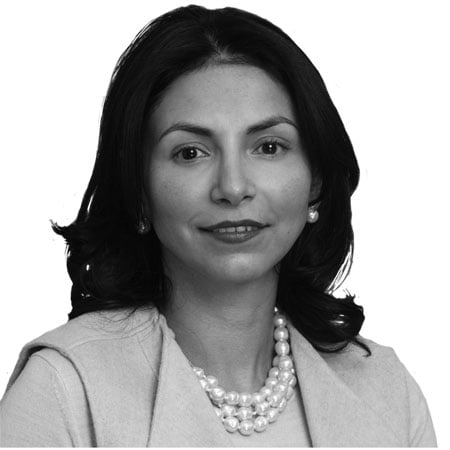Can you provide a brief overview of the office(s) you manage?
Bobby Albaral: I was appointed managing partner of the firm’s Dallas office in 2017, then in July 2019 – as we combined the Dallas and Houston offices into one collaborative Texas team – I was appointed the Texas office managing partner. Baker McKenzie has been in Texas for 30-plus years, first in Dallas in 1986 and then in Houston in 1997. Our lawyers in Texas are in-market legal experts with substantial experience across transactional, dispute resolution, and tax practice areas with a truly global reach. We have more than 100 lawyers in Texas advising on a wide range of domestic and international companies with interests in Texas, across the US, and major markets in every region of the world.
Maurice Bellan: Described by many as the US Embassy of Baker McKenzie, our firm’s DC office is a strategic focal point of our operations in North America. Washington, DC is the crucible of the development of US law and regulation and home to US regulatory agencies that intersect with so many of our clients’ businesses and industries. Our office is comprised of 125 lawyers with multi-disciplinary experience, but primarily focused on trade, regulatory enforcement, multi-jurisdictional investigations, and corporate and civil dispute matters. We are beacons for our local clients who wish to become global, and for our global clients wishing to tap into the local US market. We represent many of the major service organisations, industrial corporations, insurance companies, banks and financial institutions, as well as utilities, tech, transportation, and oil and gas companies.
Scott Brandman: I became managing partner of the firm’s New York office at the start of 2018 and then, in July of 2019, the Miami and New York offices merged into one management structure and I was appointed managing partner of both geographies. It is an exciting time to lead these offices, as they are both in growth mode. Our New York office added nine high performing partners in 2019. With these strategic additions, we continue to build out our North American life sciences practice, as well as add to our extremely strong M&A, private equity, government enforcement, and tax practices.
In September 2019, building on the strength of 15 offices in Latin America and numerous hubs of regional expertise throughout the firm, we made a strategic investment in the creation of a US base for our Latin America practice. The practice will centre in Miami, but draw on a seasoned team of lawyers in New York, as well as other US offices. The goal for the initiative is to serve as a bridge to our firm’s extensive platform and experience as the largest global law firm in Latin America. In line with this initiative, we were thrilled to welcome back Federico Cuadra Del Carmen, who has significant experience working on domestic and cross-border M&A, private equity, and corporate transactions in Latin America and beyond. Federico is the first of several strategic hires we will be making in the Miami market to build out our Latin America practice. We have many additional lateral partners under consideration and are excited by the traction we are getting in the market.
What are your main areas of focus?
Albaral: My main area of focus is growing our firm’s footprint in Texas and further bolstering our already substantial transactional, dispute resolution, and tax practices. Consistent with our firm strategy, we will grow with a continued focus on delivering a uniformly exceptional client experience. The energy sector in particular will take centre stage as we grow in Texas, with Houston being the industry’s global epicentre. Both Dallas and Houston also serve as a gateway to inbound and outbound investment in Latin America. Working in concert with our colleagues in New York and Miami, Latin America will continue to be a focus of our efforts in Texas. All with a ‘one team,’ collaborative approach to one of the hottest legal markets in the world across many industries.
Bellan: Building upon my predecessors, my goals include creating a stronger connection with the DC community through philanthropy and community service. We have a strategic plan to significantly grow our headcount in areas of key importance to our clients, and strengthening our reputation as the go-to firm in DC for companies doing business both locally and abroad.
Brandman: Our focus is always on our clients and our people. We aim to provide the best possible service to our clients and continue to look for ways to deliver our services with efficiency and excellence. In addition, we are committed to providing the best opportunities for our people to continue to grow and meet their professional goals. While we are looking to bring on key lateral hires for both New York and Miami, this is of significant importance in the Miami office as we are in full growth mode and are focused in our efforts to expand and support the new US base for our Latin America practice. As part of the expansion, we are pursuing efforts to upgrade our office space to meet the needs of our lawyers and clients. One of our biggest assets is the firm’s global reach, but we always like to think that the core value we provide is to our local clients and the community and we want to make our office space reflect that dedication to the community.
What changes, if any, do you plan to make?
Albaral: By combining Dallas and Houston structurally as a strategically focused Texas office with a larger and more collaborative footprint, we are already much better positioned to help our clients manage their legal affairs in Texas and around the world. Over the years, we had always seen unique business synergies that the two offices share with common clients and business opportunities. With this new structure, we are able to create efficiencies and a common focus to better serve client needs together.
Bellan: The most significant change to the DC office is our growth. Over the next 24 months, we have a strategic plan to expand our footprint in the Washington market by 40% across multiple practice areas. We are market leaders in the trade and tax practice areas and are planning to add considerable depth to these practices. In addition, our office will continue to experience steady growth in our government enforcement and regulatory practices. To facilitate our growth, and as already mentioned, we are undergoing a complete renovation of our office space that will fundamentally change the way we work and deliver client service. We will move to single-sized offices for all attorneys and professionals and increase the amount of working collaboration spaces. Post-renovation, our library will be transformed into an innovation and research hub. Lastly, our dramatic redesign of our conference centre will facilitate more client-focused events and greater interaction with the DC community.
Brandman: With the new structure of a combined New York and Miami office, we are even better positioned to serve our clients to meet their strategic objectives. Over the years we’ve begun to see the unique business synergies that these two offices share, not only with general transactional work, but particularly around inbound and outbound Latin America work and under this new structure, we are able to create efficiencies to reflect this reality.
What do you think are the biggest differences between the offices you cover?
Albaral: The biggest difference between the two Texas offices is the industry focus that we have in the energy space in Houston as compared to Dallas – energy in all its forms, including oil and gas, and renewables among other things. While we certainly have clients in other industries in Houston, including petrochemical and manufacturing, the energy sector is a particular focus there. Dallas has a broader industry base – which includes energy – but also high tech, retail, hospitality, and aviation, among others.
Brandman: I think size is the biggest differentiator between these offices. The New York office has always been one of the larger offices of the firm and our Miami office, while small, is in growth mode and we are excited to see it continue to develop and expand. One thing to note is that despite the size difference, the offices have many similarities with complementary practices and expertise that make collaboration across the two offices beneficial to both our lawyers and our clients.
How do you ensure ongoing collaboration and synergies across the firm’s offices?
Albaral: The strategic advantage we have over other firms is our ability to work seamlessly across our 77 offices worldwide. We all participate in joint-office committees and client initiatives that keep us engaged with one another on a daily basis. We also meet with one another in person quite often, whether that be in practice group oriented meetings or regional and global partners meetings. In short, our colleagues are not simply names and numbers in a global directory, but a substantial group of legal experts that just happen to be in different offices around the world.
Bellan: Our leadership team routinely meets via phone, video calls, and in-person to ensure that we are collectively working toward the firm’s mission. In addition to formal meetings, managing partners across the firm share best practices, leadership advice, and maintain genuine friendships. This spirit of collegiality among leaders is one of the many reasons that I am honoured to be a part of Baker McKenzie’s leadership team.
Brandman: We have several joint-office committees and initiatives that keep our offices connected on a frequent basis, as mentioned. We also have internal communications tools that ensure that both offices I manage make up a larger community that feels engaged. One of our objectives is to make sure these two offices are continually collaborating with the firm’s other offices within the North America region and globally.
How much work do you do with non-US offices?
Albaral: We have been the leading international law firm for decades now, helping our clients simplify and navigate an increasingly complex world. Our offices in Texas are no exception.
Bellan: As a truly global law firm, working with our colleagues in other countries is part of our DNA. I work closely with lawyers in our non-US offices to help our clients navigate cultural and legal challenges of doing business in global jurisdictions on a daily basis.
Brandman: Baker McKenzie has the great privilege of being the most geographically diverse global law firm in the world. Personally, I have worked and continue to work with a significant number of our non-US offices, as my client base includes many multinational companies who have a full range of legal and tax issues.
How much time do you spend on client work versus managing partner responsibilities?
Albaral: I have an active dispute resolution domestic and international tax practice. I balance the demands of my practice and leadership roles with the help of an extremely talented leadership team in Houston and Dallas. We have a five-person Texas management team in place, with Brendan Cook, Denmon Sigler, and Jonathan Martin in Houston, along with Kevin Maher in Dallas, all of whom contribute significantly to our success.
Bellan: Finding balance is a result of our team-based approach to both staffing client matters and leading the firm. Our clients are our lifeblood and their well-being is at the heart of what we do, therefore our internal leadership structure allows for coverage and redundancies to ensure that someone is always available to tend to the business of managing the firm. For example, my practice operates with a regional steering committee and the DC office is full of formal practice group leads and informal leaders willing to provide leadership, mentoring, and counsel at a moment’s notice.
Brandman: I have been with the firm for over 20 years, and my primary focus is to serve my clients to the best of my ability. As I grew in my career, I began to take on leadership roles on the firm’s Diversity and Inclusion Committee as well as the Partner Compensation Committee and the North America Hiring Committee. I believe in the importance of contributing to the firm and being an active change-maker. While my responsibilities have grown over the years and I spend more time now on the management front, my true love is always working with my clients and I’ve been honoured to have worked with many of those clients for the span of my career.
How do you personally think Baker McKenzie is differentiated from your competitors?
Albaral: Our client service is unparalleled. We value personal relationships and strive to deliver smarter solutions to our clients. Using an unrivalled global platform and the best local talent, we bring the whole firm to our clients. Local access. Global reach.
Bellan: As an international law firm, we provide excellent service in far-flung markets. We are not simply a US firm with global outposts, but a firm that has strategically grown by hiring exceptional lawyers local to each of the 77 cities in which we operate. It is not uncommon for my peers at other firms to call us in search of local counsel who can assist their clients – even if that firm has an office in the same jurisdiction. This gives us a distinct advantage in advising clients who conduct business in the US and around the globe.
Brandman: I also believe that our international reach is what truly sets us apart from our competition. It is an incredible asset to our lawyers and clients and gives us the ability to provide seamless service to our clients in the US and abroad. Being nimble to meet the needs of the client is also something that sets us apart. We have been watching Florida’s business market growth over the past few years, particularly around companies expanding and even moving their headquarters to the area. We responded by growing our Miami presence to meet those needs, understanding that our clients require not only on-the-ground support, but access to our world class Latin America practice of 850 lawyers across 15 offices in seven countries.
What have been the key success stories since you became managing partner, or in the past couple of years?
Albaral: Bringing the One Texas Team approach into fruition is a great achievement, and looking to our counterparts in Texas, is a positive differentiator. This collaborative approach will allow us to better utilise our expertise and resources to benefit our clients, employees, and communities.
Bellan: I am proud to have played an integral recruiting role in expanding our regulatory capabilities in the DC office while also improving ethnic and gender diversity. In the past few months, we have grown our FDA practice with the hire of Veleka Peeples-Dyer and Khelin Aiken from McDermott, Will & Emery. We have also built a financial regulatory and enforcement group by adding a team from Morgan Lewis which includes Amy Greer, Valerie Mirko, and Peter Chan who all spend significant time working with the DC office.
In addition, since I became managing partner of the DC office, the ethnic and gender diversity of the office has improved by nearly 10%. We are both excited and humbled by our progress but recognise that there is still much more work to improve the representation of diverse lawyers in major firms in our marketplace.
Brandman: One of our success stories has been our lateral growth, we added nine key partners in the New York office in 2019 and are poised for similar growth in our Miami office. One of the key differentiators in drawing these top-notch laterals is the knowledge that they are joining a firm with an incredible global footprint as well as strong regional and local platforms with practices that are on the cutting edge of business and legal issues.
With the mention of D&I, can you each expand on what your involvement has been in the firm’s D&I efforts?
Albaral: In Texas, we work closely with the firm’s North America D&I team to promote an inclusive environment and focus on recruiting, developing, and promoting diverse attorneys. I serve on the firm’s Global Diversity & Inclusion Committee. Our global D&I initiative is owned and championed by the highest levels of our leadership. As an office managing partner, I strive to cultivate a diverse and inclusive environment through leadership, policies and practices, as well as client and community outreach. Our approach is global and inclusive. We have more than 13,000 employees in 46 countries who speak 80+ languages, and we are working to ensure that all of our people feel included and empowered.
I am proud of our recent D&I achievements including:
- The Mansfield Rule: Baker McKenzie is piloting the Mansfield Rule 3.0 and we also received Mansfield Plus Certification in 2019;
- Global Aspirational Targets: In 2019, we enacted the 40:20:20 global gender targets and are working to have 40% women, 40% men, and 20% flexible (non-binary persons) representation by July 2025;
- LIFT sponsorship programme: Launched in 2017, Leaders Investing for Tomorrow (LIFT) is a landmark sponsorship initiative for women, designed to support key talent in progressing to leadership roles;
- #WeAreNotNeutral: Baker McKenzie is not neutral on issues impacting the LGBT+ community. The firm’s Global BakerPride+Allies Business Resource Group brings together partners and senior business services professionals from across the globe to advance LGBT+ equality;
- bAgile: In 2017, we instituted bAgile, a global flexible working policy; and
- PointOne: An initiative to promote a safe, respectful, and inclusive workplace which sets out clear behaviour policies and expectations and avenues for people to raise concerns and access support.
Bellan: As the first African-American managing partner of any Baker McKenzie office globally, I am keenly aware of the strides that our firm is taking towards building a diverse and inclusive law firm and of the work that still needs to be done. One of the things that truly sets us apart is our ability to leverage the different languages, cultures, and perspectives we have and place a real focus on diversity and inclusion.
At Baker McKenzie, every employee has a responsibility to foster an inclusive work environment. As a member of the firm’s D&I steering committee for our Global Disputes team, Chair of the Hiring Committee for our Litigation and Government Enforcement practice, and as an office managing partner, it is my responsibility to oversee the local execution of our diversity goals. The difference between having a great D&I plan on paper and seeing those goals come to life is having local leaders who take responsibility. In addition to my role in recruiting and hiring diverse professionals, I also lead our DC-based advisory board for diversity and inclusion.
I am most proud our recent accomplishment, where we hosted 160 lawyers of colour from across the region in DC for the inaugural ‘Lawyers of Color Conference’.
Brandman: I think every leader in the firm has a role to play in creating a more inclusive culture, and I see myself as a champion for women and other underrepresented groups in leadership roles in the legal profession. I was very glad to see that in our recent round of promotions, 40% of our newly elected principals globally were women. Additionally, 63% of our global leadership committees are now comprised of more than 30% of women. Over the past three years, global promotions to partner have averaged at 40% women.
Over the past two years, the North American Leadership team has been comprised of over 60% women, attorneys of colour, and members of the LGBTQ community. In addition, we have made great strides showcasing our commitment to diversity in our partner ranks with females accounting for 53% of new promotions to equity partners in 2019.
We are also focused on diversity beyond gender and have comprehensive policies in place to further the retention, development, and advancement of diverse professionals more broadly. For example, to further advance the racial and ethnic diversity of our leadership, our US and Canada offices recently adopted targets for racial and ethnic minorities to comprise 15% of equity partners, 20% of non-equity partners, and 15% of leadership by 2025. Early in 2020, we hosted an inaugural ‘Lawyers of Color Conference’ in DC which brought together our 160+ lawyers of colour from the US and Canada for two days of meaningful dialogue, networking, and professional development.
Our diversity makes our global community stronger and helps us in solving complex problems and designing practical solutions for our clients. D&I is not only the right thing to do, it provides our clients with a competitive advantage.
Robert (Bobby) Albaral: managing partner of the firm’s Dallas and Houston offices. Bobby is a partner in the firm’s Tax Practice and represents multi-national corporations at various stages of federal, international and state tax disputes, both administratively and in court. He is a member of the firm’s Diversity and Inclusion Committee as well as the firm’s North American Regional Counsel and Global Policy Committee. Maurice Bellan: managing partner of the Washington, DC office since July 2019 and a member of the Global Dispute Resolution and North America Litigation and Government Enforcement Steering Committees. Maurice most recently served as vice chair of the Litigation and Government Enforcement Practice, and he leads the firm’s False Claims Act (FCA) and Government Contracts Practice. Scott Brandman: managing partner for the firm’s Miami and New York offices. He is a member of the firm’s North America Regional Management Committee and chairs the Compensation Committee and Hiring Committee. Previously, he was a member of the Diversity & Inclusion Committee. In addition to advising clients on tax matters, Scott serves as the global relationship partner for several multinational companies. In this capacity, he works closely with senior management teams to ensure seamless service across the firm and serves in a lead role on major multijurisdictional projects.








